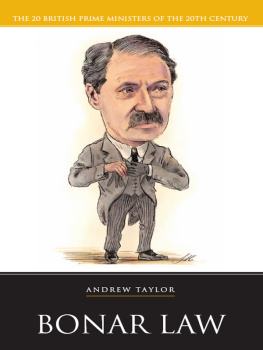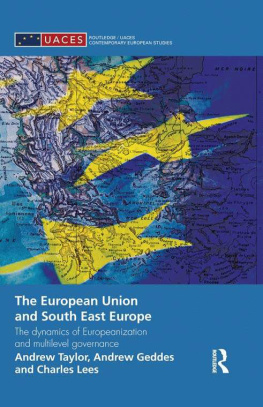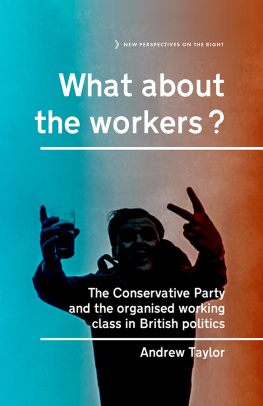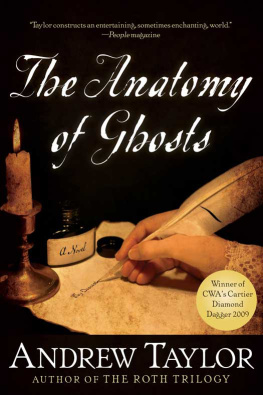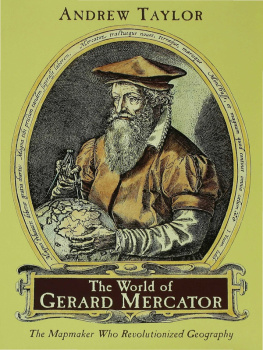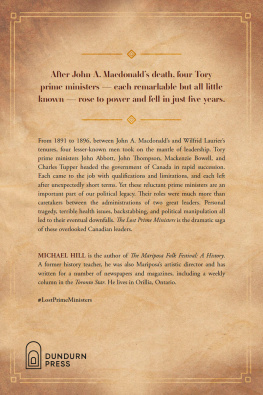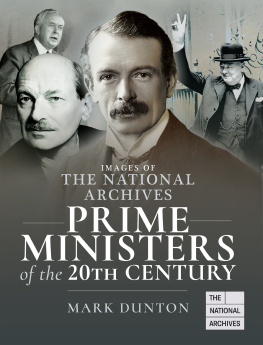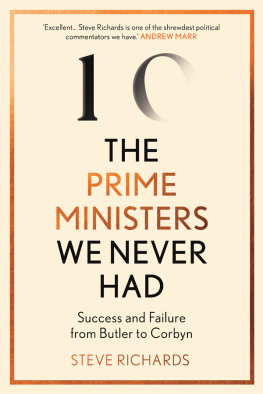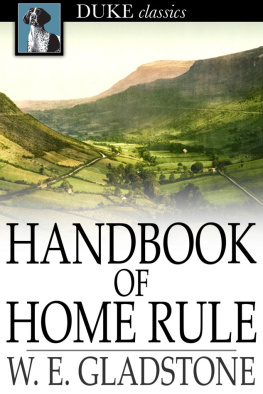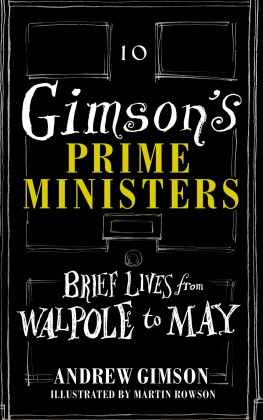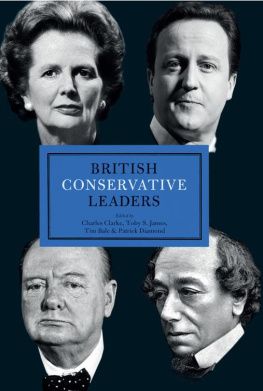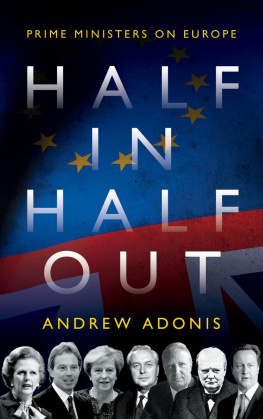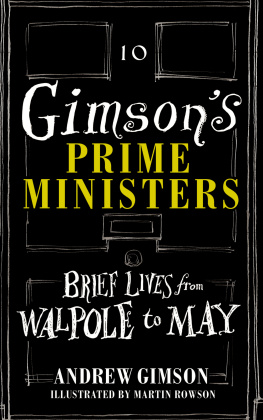First published in Great Britain in 2006 by
Haus Publishing Limited
26 Cadogan Court
Draycott Avenue
London SW3 3BX
www.hauspublishing.co.uk
Copyright Andrew Taylor, 2006
The moral right of the author has been asserted
A CIP catalogue record for this book is available from the British Library
ISBN 1-904950-59-0
Designed by BrillDesign
Typeset in Garamond 3 by MacGuru Ltd
Printed and bound by Graphicom, Vicenza Front cover: John Holder
CONDITIONS OF SALE
All rights reserved. No part of this publication may be reproduced, stored in a retrieval system, or transmitted in any form or by any means, electronic, mechanical, photocopying, recording or otherwise, without the prior permission of the publisher
This book is sold subject to the condition that it shall not, by way of trade or otherwise, be lent, re-sold, hired out or otherwise circulated without the publishers prior consent in any form of binding or cover other than that in which it is published and without a similar condition including this condition being imposed on the subsequent purchaser
Chapter 1: Background
Andrew Bonar Law became Prime Minister at the age of 64 on 23 October 1922. On 19 May 1923, diagnosed with inoperable throat cancer, Law resigned, dying on 30 October. He was Prime Minister for only 209 days. Hence The Unknown Prime Minister, the title of Blakes biography. Laws career coincides with the emergence of modern British politics. He entered Parliament in 1900 and left it in 1923, for over half of this period (13 November 1911 to 21 March 1921 and 23 October 1922 to 28 May 1923) he was leader of the Conservative Party. Between December 1916 and March 1921, when he first retired from politics, he was de facto Deputy Prime Minister, as well as Chancellor of the Exchequer and Leader of the House. He was instrumental in destroying two prime ministers, Asquith and Lloyd George. In these 23 years Law confronted the rise of socialism, the advent of the welfare state, the onset of Britains relative economic decline, the beginning of the break-up of the Empire, and the rise of the modern state. As Conservative leader he oversaw the partys modernisation, laying the foundations of Conservative hegemony between 1924 and 1964.
Prime ministers have come not from the ranks of the extrovert, the equable and the easy-going but from the introspective, the moody and the hypersensitive. Our most eminent political leaders have been distinguished, to an exceptional This could have been written with Law in mind. He was born on 16 September 1858 in his fathers manse at Kingston in New Brunswick, Canada. The Revd. James Law was a Presbyterian minister of the Free Church of Scotland; he was born in Ulster and died in Ulster. Laws elder brother was to practise medicine there and Ulster was central to Bonar Laws political life. Laws mother, Annie (ne Kidston, a Glaswegian banking family), who emigrated to Canada, died in 1860. Janet Kidston, Annies sister, came out to look after the Revd. Law and his young family. When James remarried Janet decided to return to Scotland and offered to take Andrew, oversee his education and provide him with a business career in the family bank. The Revd. Law agreed, and Andrew left New Brunswick for Glasgow. There is uncertainty when he left Canada, 1865 or 1870, and whether he retained traces of his Canadian accent in adult life but Law was for all practical purposes, a scion of the solid, prosperous, professional Glaswegian bourgeoisie.
After preparatory school he attended Glasgow High School. He was an intelligent and hard-working boy and the Kidstons were wealthy enough to send him to Eton or Harrow, so they clearly took a decision not to do so. He left school at 16 and joined the family merchant bank. The Kidstons, three brothers and a sister, were childless and Law was heir to their fortune. Unlike the majority of the Glasgow commercial and industrial bourgeoisie who were Liberal in politics, the Kidstons were staunch Conservatives. Not only was Law exposed to Conservative politics in the home, he also met many leading Conservatives, so not surprisingly he gravitated to the Conservative Party. Law cannot be described as a doctrinal in his politics. Personally cautious and pessimistic, these traits transferred into his politics but he was attracted to Conservative imperialism, the creed of the The archetypes were men like Joseph Chamberlain, Laws self-confessed hero, and Rudyard Kipling, who was to become a friend.
Late in life Law confessed that of all the offices he held the appointment that gave him most pleasure was being made a bookkeeper at Kidstons. In 1885 Kidstons merged with the Clydesdale Bank. Unattracted by banking and anxious to strike out on his own, Law secured a partnership with William Jacks & Co, a firm of metal brokers. Kidstons had been intimately involved in financing the iron and steel industry and William Jacks & Co. was a client. In 1885 the senior partner, William Jacks, offered Law a partnership. Bankrolled by the Kidstons, Law, at the age of 27, began his independent business career.
The Glasgow iron ring was emblematic of late-Victorian capitalism, a microcosm of its strengths and weaknesses: profitable but unstable. A speculative trade subject to rapid fluctuation, the market was acutely sensitive to gossip and rumour, as well as external shocks. The iron market relied on the Scottish industry supplying large quantities of cheap iron but was facing growing competition from newer and cheaper producers in Cleveland utilising the new Bessemer technology, which could not be used on Scottish ores.
When Law joined William Jacks the Glasgow iron market was booming. Producers of pig iron lodged their output at Connals Stores, which issued warrants entitling their owners to a quantity of iron. Iron merchants like Jacks were intermediaries between producers and consumers dealing in these warrants at the Royal Exchange. The iron ring (literally, the merchants sat in a circle) met between 1112 and 23, at the end of business warrants were exchanged and cash settlements made. As a market Glasgow was facing growing competition from London, the Empires mercantile centre. Jacks diversified seeking new clients, including Krupps and the Nova Scotia Steel and Coal Company, and set up offices in Middlesborough and London. Jacks Glasgow operation eventually failed and by the 1920s Laws holdings were virtually worthless.
By the 1890s Law was, through a combination of hard work, acumen and inheritance, enjoying an annual income of about 6,000. Though no bloated plutocrat, Laws wealth conferred independence. His social origins and business career are often portrayed as marking him out as a transitional figure in party history, symbolising the shift from landed to commercial wealth. Law made no secret that his politics had been influenced by his business career; nobody knows better than I that political work cannot be done on strictly business lines but the nearer you can approach business lines the better for political work . Before 1914 one-third of the parliamentary party were businessmen and Law is often presented as their representative. He was not a manufacturer but a finance capitalist whose business career gave him a detailed knowledge of Britains Imperial political economy.
Nobody knows better than I that political work cannot be done on strictly business lines but the nearer you can approach business lines the better for political work.
BONAR LAW
Law did not attend university. He was, however, a voracious reader of history (Carlyle and Gibbons The Decline and Fall of the Roman Empire were favourites) and mystery stories and he attended early-morning lectures at Glasgow University before work. His autodidacticism was, like business, a means to an end: a political career. The Glasgow Parliamentary Debating Association, of which Law was an active member for a decade, modelled itself on the House of Commons procedures. It conducted debates under a Speaker and published a Hansard; it passed bills, it had a Prime Minister, ministers and a Leader of the Opposition and its members represented constituencies (Laws was North Staffordshire). Here, and as a spectator in the bankruptcy court, Law developed and honed his rhetorical skills and his biographers see the Association as Laws Oxford Union, which prepared him for the House of Commons.

